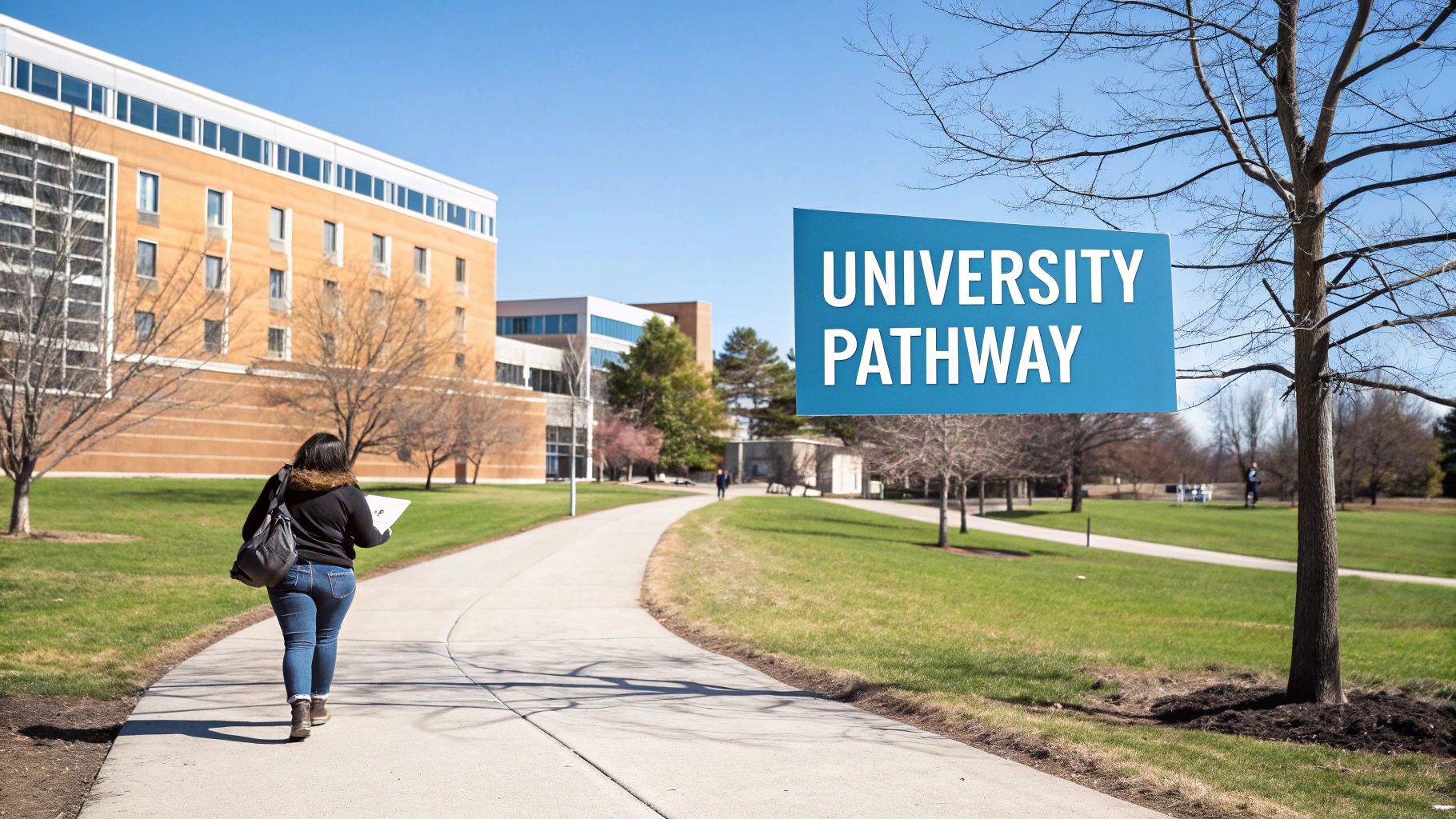So, you’re dreaming of becoming a midwife but don't have the A-Levels you need to get into university? You're not alone, and it's definitely not a dead end. This is exactly where a midwifery access course comes in.
Think of it as your dedicated pathway to university. Officially, it’s called an Access to Higher Education (HE) Diploma, and its whole purpose is to bridge the gap between where you are now and where you want to be – studying a midwifery degree.
Your Bridge to a Midwifery Degree

Imagine wanting to build a house – your career as a midwife – but you don't have the original blueprints, the A-Levels that universities ask for. A midwifery access course is like a specialist architect who draws up a brand new, university-approved set of plans based on your life experience and passion. It carves out a respected and legitimate route for you to achieve your goal.
These courses are built from the ground up for adults returning to education. It doesn't matter if you're switching careers, a parent ready for a new challenge, or just someone whose school journey didn't lead to uni the first time around. This diploma is your fresh start. It recognises that your life experience is valuable and gives you the focused academic training you need to succeed in higher education.
Who Is This Course For?
An access course is perfect for anyone who has the passion and drive to become a midwife but is missing the specific Level 3 qualifications needed to apply for a degree. This usually includes:
- Career Changers: People from totally unrelated fields who've found their calling in midwifery.
- Parents Returning to Education: Individuals who put their academic journey on hold to raise a family and are now ready to chase their professional dreams.
- Adults Seeking a Second Chance: Those who didn't quite get the grades they needed at school but are now more focused and determined than ever.
This pathway is so important for building a diverse and experienced midwifery workforce. It opens doors for people whose life journeys have given them incredible skills in empathy, communication, and resilience—all essential qualities for providing outstanding midwifery care.
The Core Mission of an Access Course
The course really has two main jobs. First, it gives you the essential academic knowledge in subjects like Human Biology and Health Studies, which are the bedrock of understanding pregnancy, birth, and postnatal care.
Second, and just as importantly, it helps you develop the study skills you'll need to thrive at university. We're talking about things like academic writing, critical thinking, and how to conduct proper research. You’ll learn how to learn at degree level, so you're not just thrown in at the deep end.
And this approach works. The data shows that Access to HE Diplomas are a major route into healthcare careers. In the 2021-22 academic year, over 60% of all Access to HE registrations were in health-related subjects. What’s more, women made up a massive 77% of these student groups. You can learn more about these key statistics on the Skills and Education Group Access website.
It’s a proven and incredibly popular way to get into the career you’ve always wanted.
What You Will Learn on the Course

It’s easy to think a midwifery access course is just a quick refresher of school science, but it’s so much more than that. Think of it as your pre-season training for university – a programme carefully designed to build the exact knowledge and skills that admissions tutors are looking for in a future midwife. It gets you match-fit for the real demands of the degree.
The curriculum is cleverly split into two core areas. On one hand, you’ll get stuck into the essential science subjects that form the very foundation of midwifery. On the other, you'll be developing the crucial academic skills needed to thrive, not just survive, in higher education. This dual focus ensures you don't just know the facts, but you can also articulate your understanding at a university level.
Mastering the Core Scientific Concepts
The heart of any good midwifery access course is its science modules. But don't worry, these aren't just abstract topics pulled from a textbook; they are all directly linked to the real-world experiences of pregnancy, birth, and postnatal care.
- Human Biology: This is the absolute cornerstone. You’ll explore everything from the basics of cellular biology to the intricate workings of the reproductive, endocrine, and circulatory systems. This knowledge is fundamental to understanding how a body changes during pregnancy, what happens during labour, and how a newborn adapts to life outside the womb.
- Health Studies: This module zooms out to give you the bigger picture. You’ll look at public health, ethics, and the role of a midwife within the modern NHS. It helps you understand the professional standards and values that will guide your practice every single day.
- Psychology and Sociology: Midwifery is as much about people as it is about physiology. These modules explore how social factors, family dynamics, and individual psychology can shape a person’s pregnancy journey, preparing you to offer holistic, truly compassionate care.
A midwifery access course provides the scientific grammar and vocabulary needed to understand the story of pregnancy and birth. It turns abstract concepts into practical knowledge you will use throughout your career to support families and ensure safe outcomes.
Sharpening Your Academic Toolkit
Knowing the science is only half the battle. Universities need to see that you can handle degree-level assignments, research, and critical thinking. This is where the academic skills modules prove their worth.
You’ll quickly move beyond simply memorising information. The course teaches you how to research topics effectively, structure a compelling academic essay, and analyse evidence to form your own well-reasoned conclusions. This is absolutely essential, as modern midwifery is an evidence-based profession. You'll need to constantly evaluate new research to provide the best possible care for the people you look after.
To really get the most out of your studies, understanding how to learn is paramount. Developing strong study habits now will pay dividends later, and there are plenty of science-backed tips for effective learning that can help you succeed.
These modules are specifically designed to build your confidence. By the time you need to write your first university essay or critique a research paper, you’ll have the skills and experience to do it brilliantly. You learn not just what to think, but how to think like a healthcare professional, setting you up for success from day one of your degree.
Meeting the Entry Requirements to Get Started
Trying to figure out the entry requirements for a midwifery access course can feel like a big hurdle, but honestly, it’s often more straightforward than you might think. Even though these courses are built for people who don't have A-Levels, providers still want to see that you have a good grasp of the basics. This just makes sure you're ready for the level of study ahead.
For the most part, course providers will be looking for GCSEs in both English and Maths, usually at a grade C/4 or better. A science GCSE is also a huge plus, as it lays down the essential groundwork for all the biology you’ll be diving into. It’s really important to remember that every provider has its own rules, so always, always check their website or prospectus first.
What If I Do Not Have the Right GCSEs?
If you look at the requirements and realise you're a bit short on the right GCSEs, please don’t panic. It's a really common situation, and there are clear, well-trodden paths to get you where you need to be. You've got some great options.
Think about looking into one of these alternatives:
- Functional Skills Qualifications: These are widely accepted by access course providers as a solid GCSE equivalent. A Level 2 in Maths and English is especially valuable.
- GCSE Equivalency Tests: Loads of organisations offer these tests. They give you a certificate that course providers recognise as being on par with a standard GCSE.
- Adult Learning Courses: Check out your local college. They often run evening or part-time GCSE courses designed specifically for adult learners, letting you fit your studies around your life.
Realising you don't meet the initial requirements isn't a dead end; it's simply a detour. These alternative qualifications are designed to get you back on track, proving your academic ability and dedication to pursuing your dream of becoming a midwife.
Showing More Than Just Grades
While qualifications are definitely important, your application is about so much more than what’s on paper. Your personal statement and the interview are where you get to let your passion shine through. This is your moment to show them who you really are and why you're so committed to midwifery. Our detailed guide on Access to Higher Education Midwifery courses offers more brilliant insight into this part of the process.
Use your personal statement to draw a line between your own life experiences—whether from past jobs, volunteering, or even raising a family—and the core values of the NHS, like compassion, commitment, and respect. A strong, heartfelt application that shows you genuinely understand the role will always make you stand out from the crowd.
Your Pathway from Access Course to University

Finishing your midwifery access course is a huge moment, and you should be incredibly proud. But it’s not the finish line – it's the official starting gate for university.
Think of your Access to HE Diploma as your passport to higher education. It holds the academic currency you need to get into a highly respected professional degree programme.
This currency comes in the form of credits. As you work through your modules, you’ll earn credits graded at Pass, Merit, or Distinction. Each of these grades is worth a certain number of UCAS tariff points, which is the system universities use to measure your academic achievements.
The more Distinctions and Merits you rack up, the more UCAS points you'll have. This is exactly how you build a strong application that stands out and meets the entry requirements of your top-choice universities.
Turning Credits into a University Place
Let's look at a real-world example. Imagine a student named Sarah who has just completed her Access to HE Diploma in Midwifery. Her hard work paid off, and she achieved:
- 15 credits at Distinction: Showing she has an exceptional grasp of the material.
- 24 credits at Merit: Demonstrating consistently strong work.
- 6 credits at Pass: Confirming she has met all the core standards.
When Sarah fills out her UCAS application, she won't just tick a box saying she passed. The specific combination of her grades translates directly into a UCAS points total. A university might then make her an offer asking for a certain number of credits at Merit or Distinction, proving she’s more than ready for the demands of their degree course.
Your access course grades are a direct reflection of your readiness for university. They give admissions tutors a clear, standardised way to see your academic potential and how dedicated you are to becoming a midwife.
The Quality of Your Destination
Your Access to HE Diploma is your first step towards a highly regulated and professional career. In the UK, all university midwifery degrees are overseen by the Nursing and Midwifery Council (NMC). This is a big deal – it guarantees that every graduate meets the strict professional standards needed to practise safely and effectively.
Many of these NMC-approved courses are taught in incredible, state-of-the-art facilities. We're talking about purpose-built midwifery suites with birthing pools, advanced Sim Mum birth simulators, and neonatal mannequins that let you practise complex scenarios in a safe, controlled environment. You can explore examples of these outstanding midwifery training facilities to get a sense of the amazing hands-on training you’ll receive.
What this all means is that your hard work on the access course leads directly to a qualification that is both nationally respected and intensely practical. It’s your gateway to a career providing essential, compassionate care within the NHS and other healthcare settings, fully equipped with the skills and confidence to truly excel.
How to Fund Your Midwifery Access Course

Let's talk about one of the biggest hurdles that can feel like it's standing in your way: the cost. The financial side of returning to education can seem daunting, but there are fantastic funding routes designed specifically to make your dream of becoming a midwife a reality.
The main financial tool for aspiring midwives taking an access course is the Advanced Learner Loan. This is a government-backed scheme that means you don’t have to worry about paying for your tuition fees upfront.
Think of it as a student loan, but for qualifications like your Access to HE Diploma. It covers the cost of your course, and you only start paying it back once you’ve finished your studies and are earning over a certain amount. This system is designed to take the immediate financial pressure off so you can focus on what really matters—your studies and your future career.
Understanding the Advanced Learner Loan
Applying for an Advanced Learner Loan is a surprisingly straightforward process, all managed through Student Finance England. To be eligible, you generally need to be:
- Aged 19 or over on the first day of your course.
- Living in the UK on the first day of your course (and have lived in the UK, Channel Islands, or Isle of Man for the three years just before).
- Studying with a college or training provider in England that's approved to offer them.
The great thing is, this loan isn’t based on your household income or credit history. Its sole purpose is to make sure tuition fees don’t stop you from getting the qualifications you need to move forward. You can get the full rundown in our guide to understanding Access to Higher Education funding.
The Loan Write-Off: A Powerful Incentive
Now, for the best part. This is the detail that makes all the difference for anyone on the path to midwifery.
If you take out an Advanced Learner Loan for your Access to HE Diploma and then go on to complete a university degree in a related field—like midwifery—Student Finance England will write off your entire outstanding loan balance.
That’s right. It’s not a typo or some hidden loophole. It’s a deliberate government incentive designed to encourage more people to train for essential professions like midwifery. It effectively makes your access course free, as long as you finish your degree.
Picture this: your access course costs £3,000, which you cover with the loan. Once you’ve graduated, you enrol on a BSc in Midwifery. The moment you successfully complete that degree, the original £3,000 loan is wiped clean. You’ll never have to pay a penny of it back. This benefit turns the access course into a brilliant, financially savvy stepping stone to university.
Of course, the loan isn't the only option. It’s always a good idea to see what other support might be out there. We’ve put together a quick table to show the main routes.
Funding Options for Your Midwifery Access Course
| Funding Type | Who It's For | Key Feature |
|---|---|---|
| Advanced Learner Loan | Most UK students aged 19+ on an approved Level 3 course. | Loan is written off if you complete a related university degree. |
| Self-Funding | Anyone who prefers to pay upfront without taking on a loan. | Provides complete control and avoids any future repayments. |
| Charitable Trusts & Grants | Students who may meet specific criteria set by organisations. | Can provide non-repayable funds to help with course fees or living costs. |
It's also worth looking into other potential avenues of support. Some charitable organisations offer bursaries for students entering healthcare professions. And if you have children, you may be eligible for help with childcare costs through government schemes. Always check the official resources for the most up-to-date information.
Your Step-by-Step Application Guide
Ready to take the leap? Applying for a midwifery access course can feel like a huge task, but if you break it down into smaller pieces, it’s completely manageable. Think of it like packing for a big trip – a bit of thoughtful preparation now will make sure the journey is smooth and you arrive feeling confident.
First things first: research. Start by comparing different course providers. You'll want to look at things like their course structure, the level of tutor support they offer, and whether they have a flexible online platform or require in-person teaching at a local college. Don’t forget to check reviews and success stories to get a real feel for what the student experience is like.
Preparing Your Core Documents
Once you’ve got a shortlist of providers you like, it's time to shift your focus to the application itself. This is your moment to shine and really make your case.
Your personal statement is, without a doubt, the most important part of this whole process. It's your chance to tell your story and let your genuine passion for midwifery come through. This isn't just about ticking boxes or listing qualifications; it’s about weaving your life experiences into the core values of compassionate care. For some brilliant, detailed advice, you can learn more about how to write a personal statement that will really grab an admissions tutor's attention.
Your application is more than just a form; it’s a self-portrait. Paint a clear picture of your dedication, your understanding of the midwife's role, and the unique strengths you will bring to the profession.
Getting Ready for the Interview
It’s very common for providers to invite you for an interview. This is a brilliant opportunity for them to meet the person behind the application, and just as importantly, for you to make sure the course feels right for you. Get ready by thinking deeply about what motivates you and what you understand about both the incredible rewards and the real challenges of being a midwife.
For university applications later on, interviews are a massive part of the selection process. Preparing well means more than just knowing about the course; it involves sharpening your interview skills, including learning how to answer common interview questions, such as discussing your weaknesses.
Finally, pull together all your supporting documents, like your GCSE certificates or any equivalency test results you have. Make a note of all the deadlines and give yourself plenty of time to submit everything. With a bit of careful preparation, you can walk into this process feeling organised and totally ready to succeed.
Frequently Asked Questions
Thinking about becoming a midwife is exciting, but it’s natural to have a few questions swirling around. Let's clear up some of the most common ones about midwifery access courses.
How Long Does a Course Take to Complete?
Most students complete their Access to HE Diploma in Midwifery in one year of full-time study. This usually fits neatly into the typical academic year, running from September through to June.
But life is busy, and not everyone can commit to a full-time schedule. That’s why many providers offer part-time routes. These options give you the flexibility to spread your studies over two years, making it much easier to balance learning with your work or family life.
Do I Need Prior Healthcare Experience?
This is a great question. While you don’t always need formal healthcare experience to get onto the access course itself, it is highly recommended. It’s one of the best ways to show you’re truly committed to becoming a midwife.
Getting some real-world experience, whether it's paid or voluntary, gives you a proper insight into the profession. More importantly, it makes your application for both the access course and your future university place much, much stronger. It proves to admissions tutors that you’ve seen what the role involves and you’re ready for the challenge.
Are Online Midwifery Access Courses as Good as In-Person Ones?
Yes, absolutely. As long as the online course is properly accredited by a recognised Access Validating Agency (AVA), universities see it as being on a completely equal footing with a traditional, in-person course.
The biggest advantage of online learning is its incredible flexibility, which can be a game-changer for many aspiring midwives. Ultimately, the "best" choice is the one that fits your personal learning style and your life circumstances. It all comes down to finding the environment where you will thrive.
Ready to take the first step on your journey? At Access Courses Online, we provide fully accredited, flexible courses designed to fit around your life. Explore our Access to HE Diploma in Midwifery and apply today.

